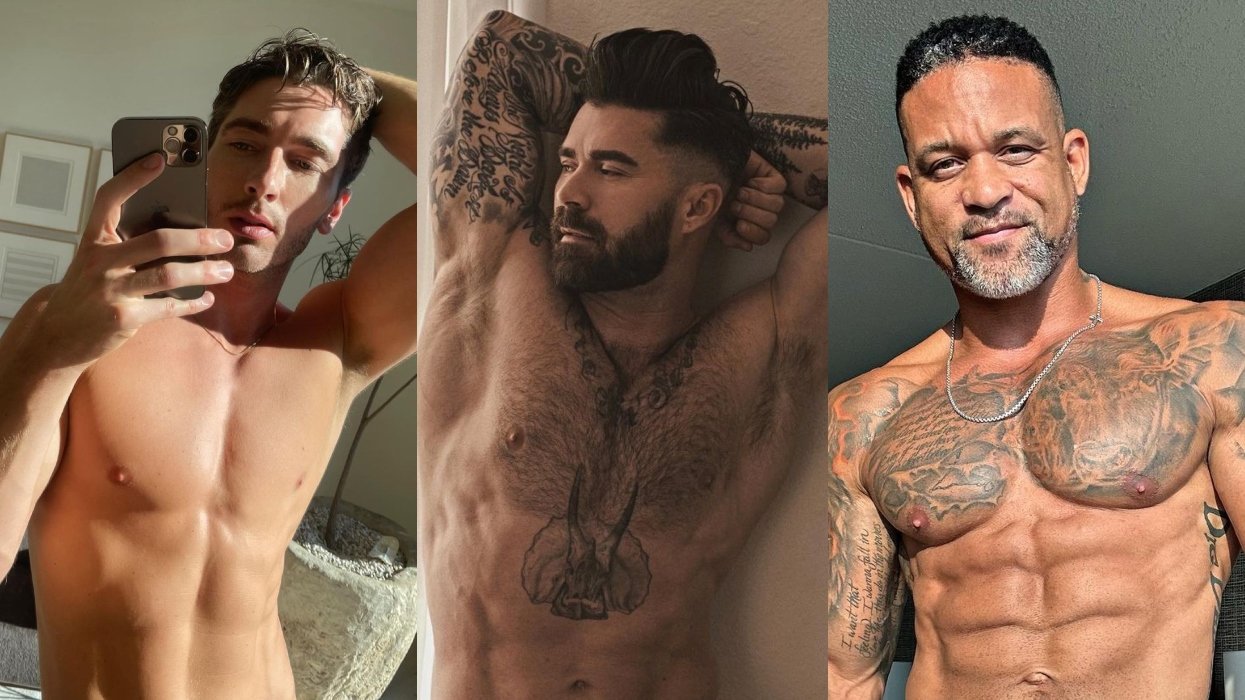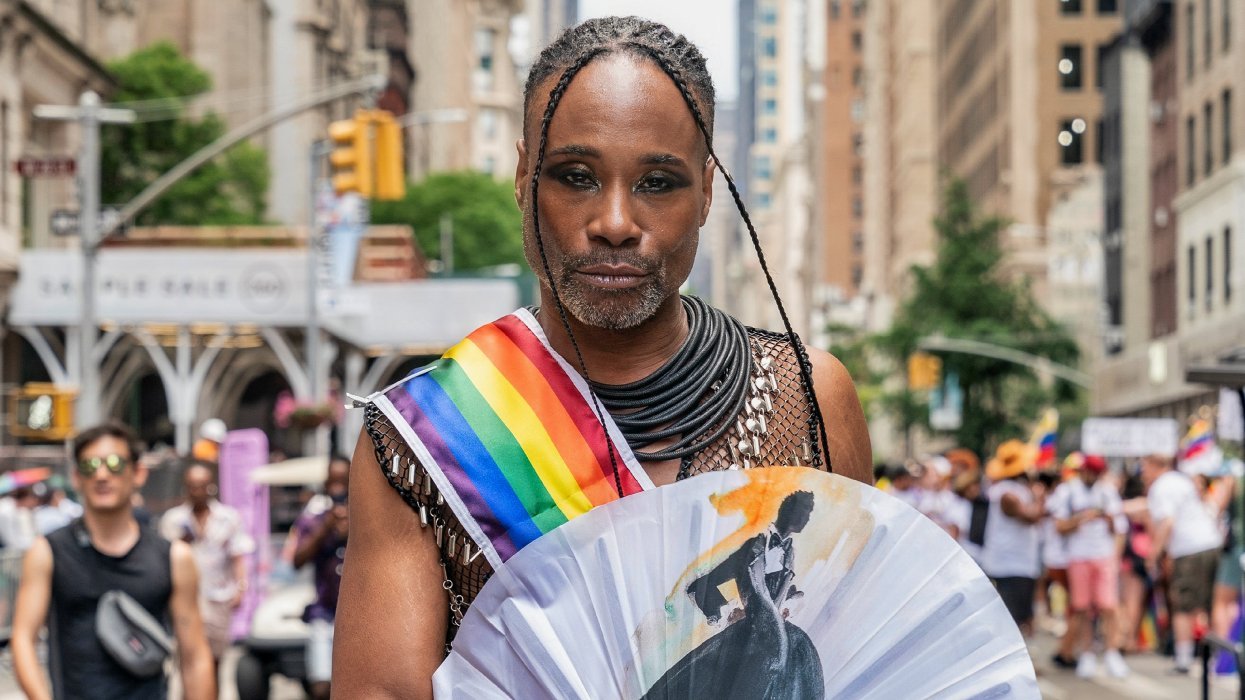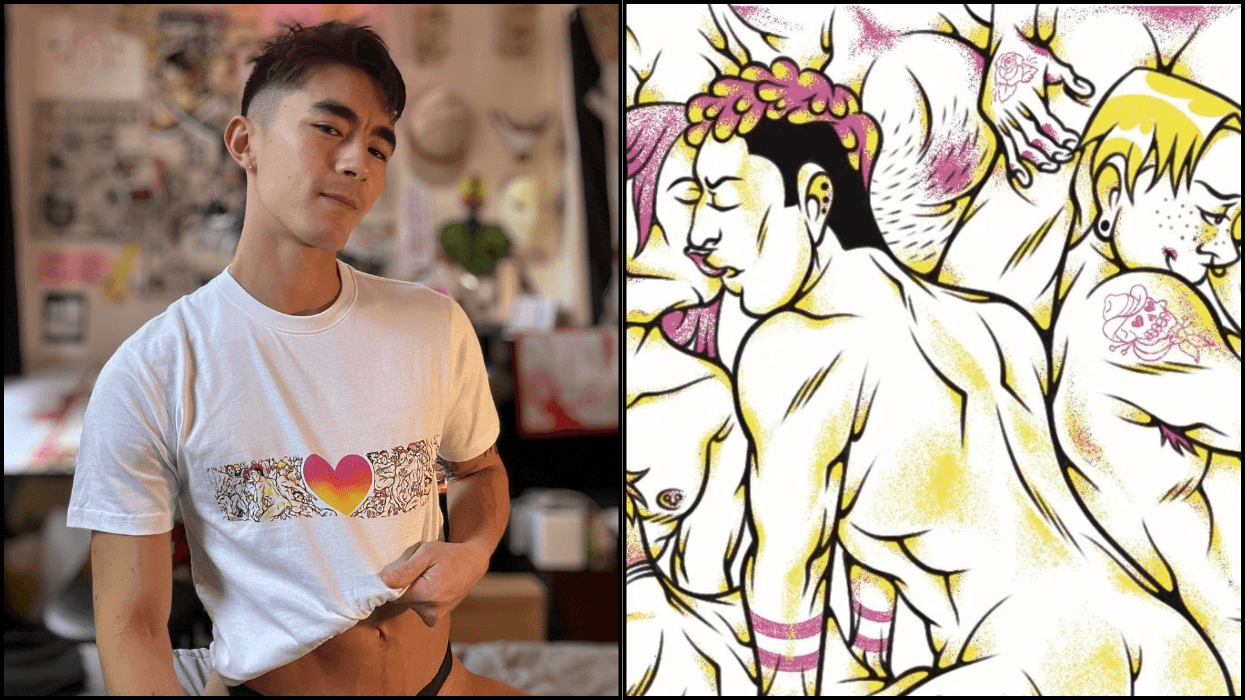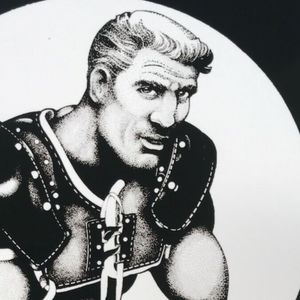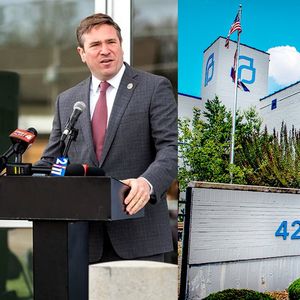If you're driving west on Interstate 76, over the Delaware River from New Jersey to Pennsylvania (or, bless you, vice versa), you'll ride over the Walt Whitman Bridge, a simple steel structure that today seems completely unremarkable. But from 1954-1956 before religious groups like the American Family Association's One Million Moms could use the internet to instantly turn fringe protests against Kraft's Zesty Guy or lesbian JC Penney spokeswoman Ellen Degeneres into national news, a long, colorful battle over Whitman's sexuality unfolded around this hard piece of steel.
Like all great gay things, this little imbroglio began bureaucratically, on June 16, 1954, when the Delaware River Port Authority Special Committee on Bridge Names agreed they needed an official title for new bridge being built between Gloucester City, New Jersey, and Philadelphia, Pennsylvania. After tossing out a few suggestions, including Betsy Ross, Thomas Paine and Thomas Edison, the committee announced on July 20, 1955, that it would name the bridge after Walt Whitman, author of Leaves of Grass, a romantic, transcendental, and sexy collection of poems that includes praise of manly love.
"No longer abash'd, (for in this secluded spot I can respond as I
would not dare elsewhere,)
Strong upon me the life that does not exhibit itself, yet contains
all the rest,
Resolv'd to sing no songs to-day but those of manly attachment,
Projecting them along that substantial life,
Bequeathing hence types of athletic love,
Afternoon this delicious Ninth-month in my forty-first year,
I proceed for all who are or have been young men,
To tell the secret my nights and days,
To celebrate the need of comrades."
Aside from the self-centered Gloucester City Council, who wanted to name the bridge after their town, not some poet whose main connection to New Jersey was that he had died in nearby Camden, few people objected the Whitman decision. Leaves of Grass was celebrating its 100th anniversary and most of the nation was in the throes of a Whitman love fest. It wasn't until a New Jersey priest awkwardly injected homosexuality into the mix that things got really juicy.
Rev. James Ryan slammed Whitman as a "naturalist, a pantheist, [and a] freethinker," in a November 1955 op-ed published in the Catholic Star Herald.
"A bridge is a beautiful, graceful structure that thrusts heavenward," Ryan wrote in the first of three essays. "The philosophy of Walt Whitman crumbles under the destructive egotism that gave him life. Godless and selfish it is powerless to thrust beyond itself." Whitman as an "egoist" who "possesses the depth of a saucer." Ryan's next article also zeroed in on Whitman's "immoral" leanings: "With his excessive glorification of the ego, one is led to suspect that Walt had not reached the maturity of thought which enables a man to make subtle distinction between and himself and God Almighty."
Though Ryan had not yet spelled out the gayness of it all, Marc Stein notes in City Of Sisterly And Brotherly Loves: Lesbian And Gay Philadelphia, 1945-1972, the language here was dripping with gay innuendo. "Lacking in 'depth,' homosexuality was seen as superficial. Identified as narcissistic, homosexuality was linked with 'selfish' 'egotism.' Permitted to exist, homosexuality would prove 'destructive' to the church," Stein writes. Instead, Rev. Ryan waited for his trilogy's climax to make explicit reference to "homosexual imagery."
"Whitman's major works exhibit a revolting homosexual imagery that is not confined to a few isolated passages but permeates the fetid whole. The author himself unblushingly admits to the presence of unnaturalness in a letter to Edward Carpenter, one of his English disciples, 'It lies behind almost every line, but concealed, studiedly concealed; some passages left purposely obscured."
 As the controversy grew, Ryan found support from Reverend Edward Lucitt, Diocesan Director of the Holy Name Union of the Diocese of Camden, and seven other high ranking Catholic leaders from the area. And like Ryan, Lucitt also tried to write around the anti-queer angle, but a few weeks later, in a December 16, 1955, New York Times article called "Catholics Decry Whitman Bridge," Lucitt explained that he was revolted by a recent Whitman biography, The Solitary Singer, in which author Dr. Gay Wilson Allen allegedly described Whitman as "homosexual."
As the controversy grew, Ryan found support from Reverend Edward Lucitt, Diocesan Director of the Holy Name Union of the Diocese of Camden, and seven other high ranking Catholic leaders from the area. And like Ryan, Lucitt also tried to write around the anti-queer angle, but a few weeks later, in a December 16, 1955, New York Times article called "Catholics Decry Whitman Bridge," Lucitt explained that he was revolted by a recent Whitman biography, The Solitary Singer, in which author Dr. Gay Wilson Allen allegedly described Whitman as "homosexual."
But Dr. Allen himself balked, telling the Times he didn't use "homosexual" at all: "I used 'homoerotic' rather than homosexual because the latter suggests sex perversion. There is absolutely no evidence that Whitman engaged in any perverted practice." He then compared Whitman to Catholic saints: "Dr. Allen said that Whitman's writings showed a 'strong affection for man,' hence were 'homoerotic.' That affection, he said, has dominated much religious writing. 'Many saints showed the same feeling,' he added."
Dr. Allen and Rev. Lucitt's public spat led to a national parsing of what 'homoerotic' actually meant, and whether it mattered. The New York Post wrote that if "sexual deviance" were part of Whitman's biography, that was immoral and therefore the bridge should not be named after the poet. "Whitman's biographers say he wasn't a sex deviate...but they keep hinting around," wrote columnist Murray Kempton. "If there were any such things about him, we don't think he deserves having a bridge named after him."
A Connecticut reader found the whole thing to be nonsense, writing, "Michael Angelo was a homosexual. Why don't they destroy the Sistine chapel?" And a Seattle woman named Phoebe T. O'Neill was completely confused by the matter. She sent a letter to the pro-Whitman Catholic paper the Ave Marie, which made it known they thought Ryan and Lucitt should be using their positions for more important matters, and wondered whether the Times, the Post and other media shouldn't be a more explicit: "For goodness sake, when using such terms of homoerotic, please define a little for poor lay-folk like me." Gay magazine ONE Inc was also accused of not being clear enough when wouldn't say whether Whitman was gay. They responded with their own parsing:
"...The term homosexual is [a] matter of degrees and types...Those who live homosexuality night and day are a world apart from those who are casually involved now and then, or those called repressed homos."
Then, on January 27, 1956, when, five weeks into a media blitz, gay Whitman protest reached its peak when 467 people sent the naming committee a five-point form letter against Whitman. "In what way has he inspired or influenced American democracy for good?" they collectively wondered, overlooking his hundreds of poems praising democracy, including "For You, O Democracy," from Leaves of Grass.
Another justification for ditching Whitman: He "held Christianity in contempt." They also claimed Whitman "attempted to teach rebellion against the natural law of God," and in the final point, the protesters brought in some of that tried and true 50s-era communist anxiety. Whitman's political philosophy was "alien to Jeffersonian democracy," and "he is the Poet Laureate of the World Communist Revolution."
Despite the fact that this was all in the 1950s, when smearing the queer and catching the communist were both becoming national pass times, and despite the fact that everything the anti-Whitman crusaders said was true -- he did love men and communists did love his work -- the naming committee ignored the moralistic outrage, the bridge opened on May 16, 1957, and for almost six decades has remained named after Whitman, a lover of men. It's a testament to this nation's ability to embrace difference, rather than reject it.
Perhaps One Million Moms and their related anti-gay busybodies can ponder this lesson next time their trying to figure out how to get into Philadelphia: a bridge named after a homo poet or another named after Benjamin Franklin, an admitted deist. Or maybe OMM and company will just avoid reality all together and stay home.




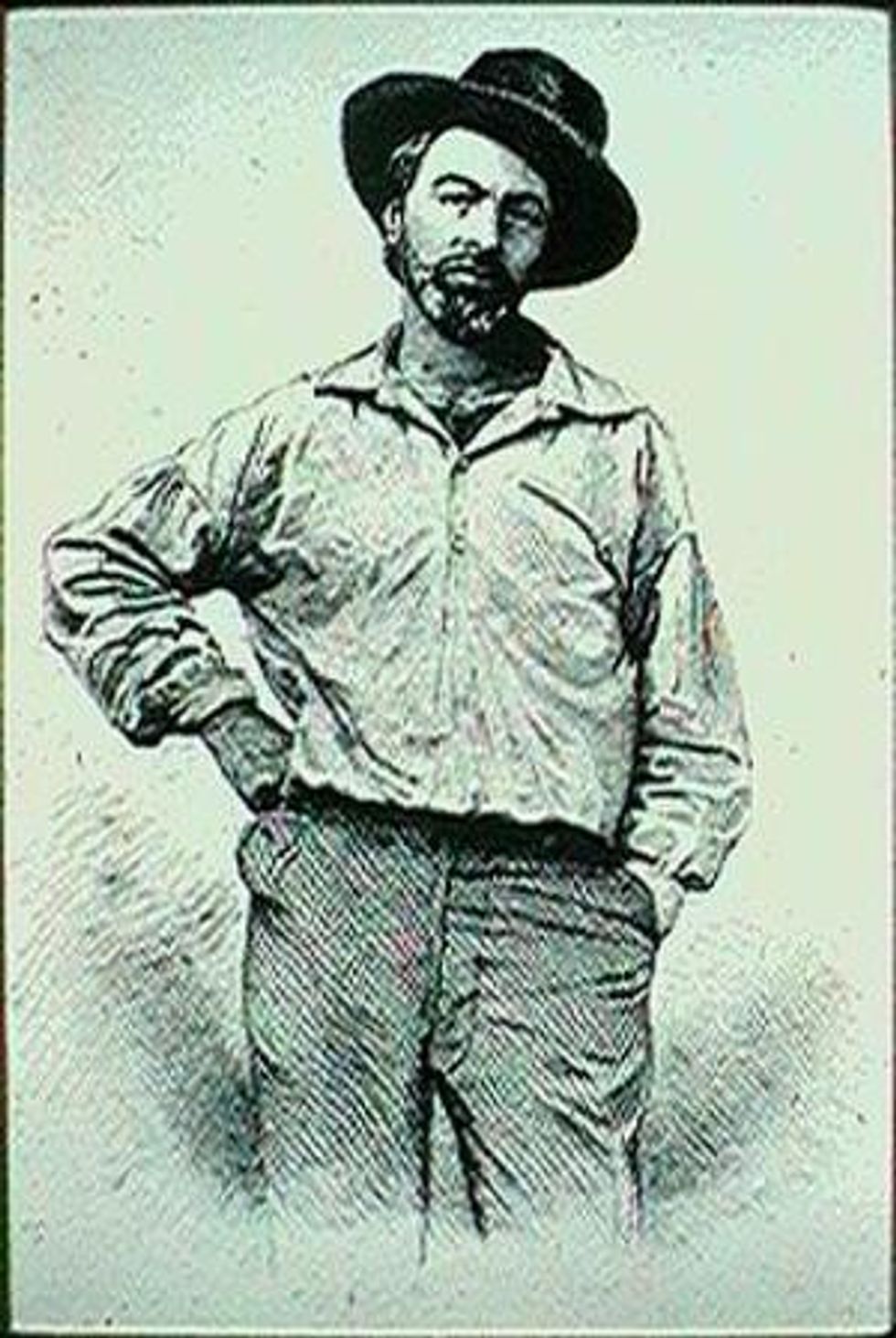
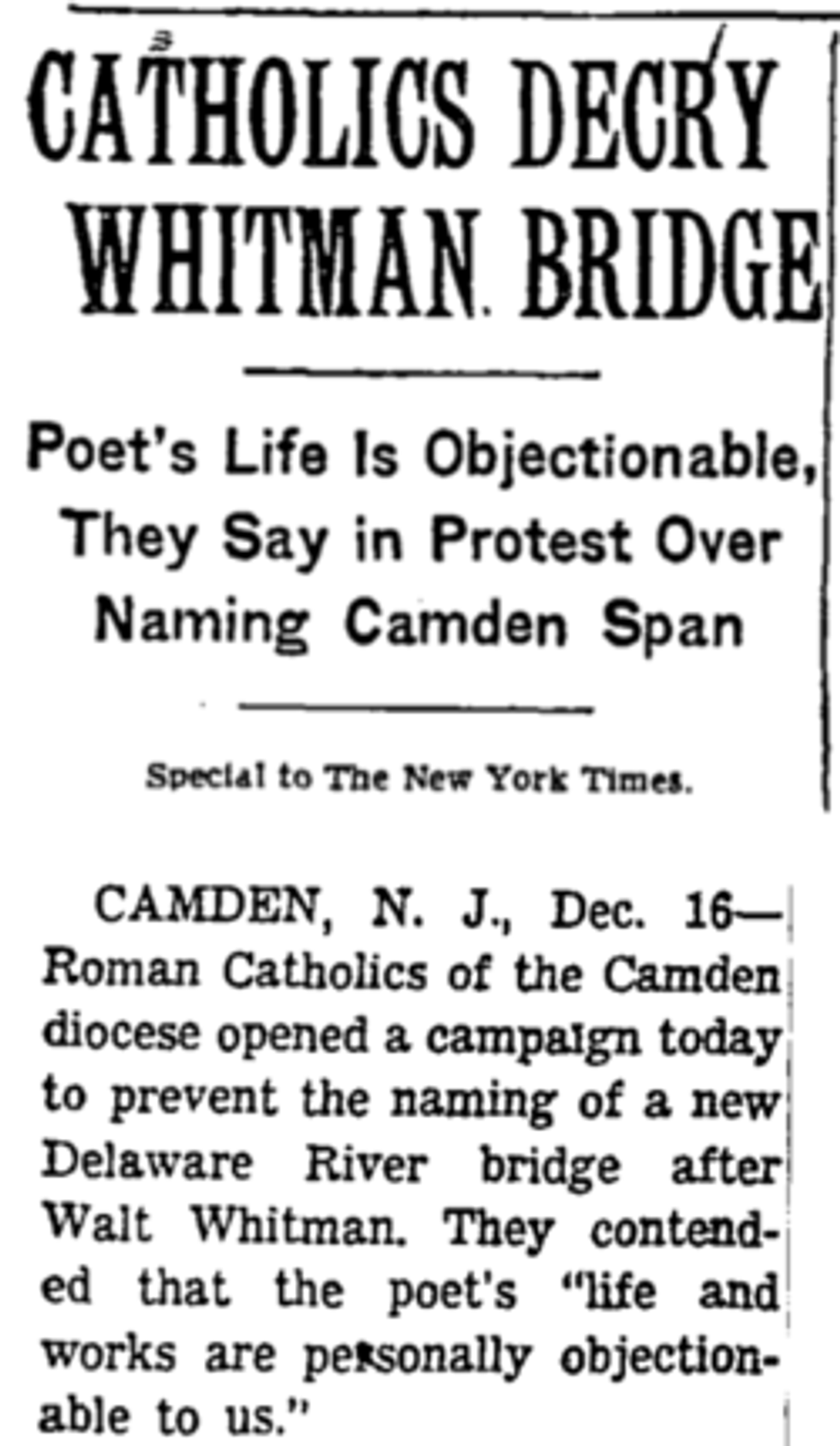 As the controversy grew, Ryan found support from Reverend Edward Lucitt, Diocesan Director of the Holy Name Union of the Diocese of Camden, and seven other high ranking Catholic leaders from the area. And like Ryan, Lucitt also tried to write around the anti-queer angle, but a few weeks later, in a December 16, 1955, New York Times article called "
As the controversy grew, Ryan found support from Reverend Edward Lucitt, Diocesan Director of the Holy Name Union of the Diocese of Camden, and seven other high ranking Catholic leaders from the area. And like Ryan, Lucitt also tried to write around the anti-queer angle, but a few weeks later, in a December 16, 1955, New York Times article called "




